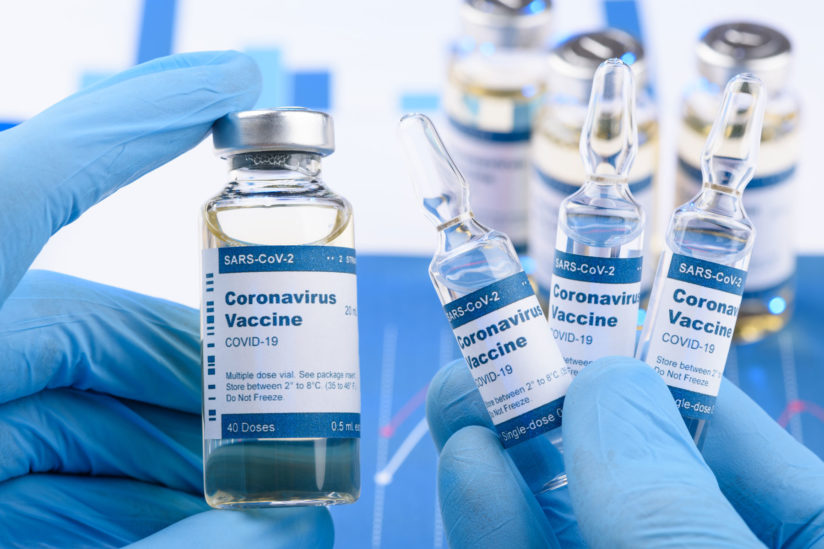Nigeria’s seeming vaccine discrimination
Last September, the federal government through the Presidential Task Force (PTF) on COVID-19 was given the sample of the first COVID-19 vaccine by a delegation headed by the Russian ambassador to Nigeria, Mr. Alexey Sherbashin. The sample of the then newly developed and first vaccine, Russian made Sputnik-V was handed over to the authorities with […]

Covid vaccine (Photo/iStock)
Last September, the federal government through the Presidential Task Force (PTF) on COVID-19 was given the sample of the first COVID-19 vaccine by a delegation headed by the Russian ambassador to Nigeria, Mr. Alexey Sherbashin. The sample of the then newly developed and first vaccine, Russian made Sputnik-V was handed over to the authorities with a guiding aide memoir to enable the Nigerian medical and regulatory bodies to conduct further study on the vaccine sample, but nearly eight months after, nothing has been heard from the Nigerian authorities about Sputnik-V.
The Russian ambassador who presented the vaccine sample has suggested then, that Nigeria may consider to put together an expert team to collaborate with the Russian side for possible clinical trials of the vaccine.
There was no evidence in the public domain to indicate that Nigeria has initiated a response for a trial of the efficacy or otherwise of the Russian made Sputnik-V vaccines. Despite that, a research article published in September last year in the highly-rated UK-based science journal, “The Lancet” acknowledged that Sputnik-V passed early trials conducted on patients, as it helped develop anti-bodies without causing any serious side effects, the Nigerian managers of the COVID-19 pandemic maintained complete aloofness to the first developed vaccines against the pandemic despite having been fully briefed by the Russians and provided with samples and other accessories that would enable a scientific study of the vaccine.
Nigerian authorities, especially the COVID-19 pandemic managers, despite making no effort at instituting indigenous efforts at vaccine development was dutifully waiting for the West to make a breakthrough with the vaccine development. With the Pfizer and AstraZeneca vaccines developed in the US and UK respectively, Nigeria’s pandemic managers cheered enthusiastically in a sheepish neo-colonial context, and was waiting sheepishly to receive the vaccines. The Pfizer vaccines which needed a certain condition of temperature storage and which Nigeria’s elite managers of the COVID-19 pandemic did not have, was dutifully by-passed on account of inadequate storage facility. Dates after dates passed while the Nigerian authorities waited for the arrival of the Astra-Zeneca vaccines, which eventually did but was trailed almost immediately with international controversy over incidences of blood clot observed in some countries across Europe.
Since the arrival of the first batch of Astra-Zeneca vaccines, which was actually manufactured in India, subsequent batches have been held back because India has had the highest rate of infections and is likely keeping the vaccine for its domestic uses.
However, in a compelling irony that would bother the Nigerian managers of COVID-19 pandemic, assuming that they are ever concerned or cared, India has approved the use of Russia-made Sputnik vaccine as a way to diversify their basket of available vaccines. India, which we wait on endlessly to supply other batches of vaccines and which is currently contending with the unfortunate surge in COVID-19 infections and deaths, may not likely deliver any more batches on schedule.
In the middle of March, India’s authority announced a temporary ban on exports of its Oxford-Astra-Zeneca vaccines, in a move that was considered to jeopardising global vaccine supplies, but the action, given the surge of the pandemic in India, is understandable.
The shock is that Nigeria’s COVID-19 managers pretended as if they do not know that India would not be supplying the vaccines for the nearest future.
In addition to the Russian Sputnik vaccine, China has developed and approved four vaccines against COVID-19 for general use. The vaccines developed and approved by the Chinese relevant authority, include Sinovac, Sinopharm, CanSino, and Biologics. Several countries signed a deal with Sinovac including Singapore, Malaysia, the Philippines, and Turkey while UAE Bahrain, Egypt, Morocco, Algeria and several other African countries have approved Sinoparm. In fact, according to the Chinese government, the country has provided vaccines assistance to 69 countries and two international organisations and exported vaccines to 28 countries including several European countries.
That Nigeria which has very warm and friendly relation with China and our managers of COVID-19 pandemic have ignored the Chinese made vaccines, which are widely in use across the world while ostensibly waiting in vain for the Oxford-India AstraZeneca vaccines is both curious and surprising.
The focus on the costly AstraZeneca vaccines, despite the international controversy trailing it, raises question about the reason for vaccine discriminations currently in practice by the Nigerian authorities.
As in everything Nigerian, is it that vested and special interests have constrained the relevant authorities from broadening our vaccines basket, so that we can have the best deal in terms of cost and availability.
With the campaign on COVID-19 vaccination still epileptic with just about 3.4 million doses available for over 200 million people, it is instructive that Nigeria takes a bold step further to assess other internationally recognised vaccines.
While the Covax process of accessing vaccine remains a veritable option, Nigeria is considerably significant to enter into direct contact with makers of vaccines with a view to negotiate favourable costs and a more efficient delivery mechanism. If funds are available as it is suggested, tying the country to the bureaucracy of the Covax process may not only be cumbersome but may not be cost effective. The seeming vaccine discrimination by the Nigerian managers of the COVID-19 pandemic is an ill wind that blows no good to the country and may actually be playing to the pockets of special and vicious vested interests that have traditionally ambushed the best and well-intentioned public policy, causing the country to look big for nothing externally while undermining and eroding citizen’s trusts of government, domestically.
Charles Onunaiju sent this piece from Abuja
